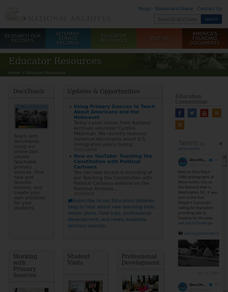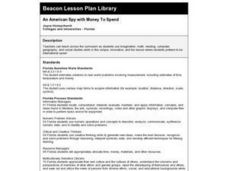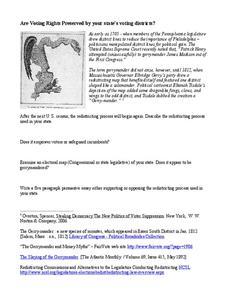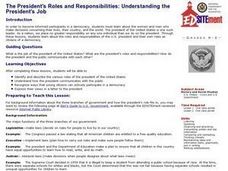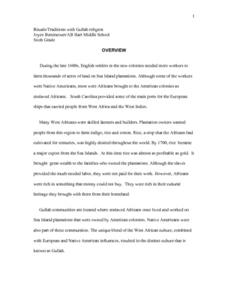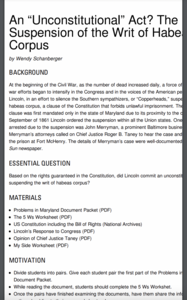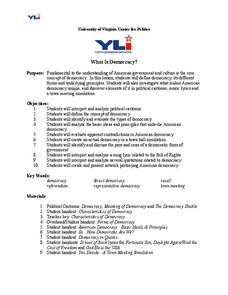Curated OER
Jackie Robinson, Civil Rights Advocate
Students examine the life of Jackie Robinson and the ways in which he and they can influence government policy.
Curated OER
Who's Who in Government: Past, Present and Future
Twelfth graders research a list of governmental leaders of South Carolina's past and present. They briefly identify each by writing a short summary which includes the dates of their political career, party affiliation, positions held in...
Curated OER
Linking the Past with the Present
Fifth graders explore how Africans built South Carolina into an economic giant. They write an expository paper explaining how Africans and their descendants built the rice empire along the Carolina coastline. They write a persuasive...
Curated OER
The Homestead Act of 1682
For this American West worksheet, students read about the Homestead Act of 1682. Students read 8 paragraphs and complete the 3 activities for the worksheet.
Curated OER
Priorities and Power: Migrants and Voting
Students examine the African-American migrants entry into the political process. They summarize their findings in a short essay.
Curated OER
Does This Belong to You?
Fourth graders examine legislation that has been passed to protect the rights and religion of Native Americans. In groups, they discuss their feelings on others taking artifacts from Native American sites and what they do if they find...
Curated OER
Changing Opinions
Students compare their preconceptions of Native American movement with their current perceptions. They identify why they have changed. Students conclude with a final reflection addressing how they define the Native American experience in...
Curated OER
Sioux Treaty of 1868
Students explore and research the history of Native Americans in North America.
Curated OER
An American Spy with Money To Spend
Sixth graders use their imagination, math, reading, computer, geography, and social studies skills in this unique, innovative, and fun lesson where students pretend to be international spies!
National First Ladies' Library
State Dinners And Funerals: Protocol And Diplomacy
Learners investigate the use of dinners and funerals as protocol in the life of American Government. They conduct research using the internet and a variety of resources. The information is used in order to answer key questions about...
Curated OER
Supreme Court
Eleventh graders explore the redistricting process. In this American Government lesson plan, 11th graders examine the electoral map. Students write an essay posing an argument for the redistricting process.
Curated OER
The President's Roles and Responsibilities: Understanding the President's Job
Students examine the roles and responsibilites of the president of the U.S. They identify and discuss the three branches of U.S. government, view and discuss a White House Photo essay online, and create a class book entitled, 'If I Were...
Curated OER
THEMATIC ESSAY
Students Compare and contrast the beliefs and methodology of three leaders of the Civil Rights movement. Using specific examples, discuss how these leaders were either successful or unsuccessful in attaining their goals.
School Improvement in Maryland
United States Foreign Policy
Policies of United States government which promote or fail to promote relationships with other countries—national defense, arms control, security of other nations, trade, human rights, economic sanctions, foreign aid, etc.—come under...
Curated OER
The French Revolution
Tenth graders explore the events leading up to the French Revolution. In this World History instructional activity, 10th graders participate in a class discussion as the teacher shares a Powerpoint presentation, then the students...
Curated OER
"Hard Times Come Again No More" : Letters From Arkansas Families in the Great Depression
Through this series of terrific lesson plans, pupils learn about the extent of poverty in the state of Arkansas during the Great Depression. They read documents from the period which describe how hard times were, view an online photo...
Curated OER
Rituals/traditions with Gullah religion
Sixth graders discuss some of the earliest people who lived in each region in order to comprehend how humans interacted with the environmental conditions at that time. They make connections to present-day regions including...
Curated OER
"Father" of Our Country vs. "Father" of the Bill of Rights
Students examine the relevance of the Bill of Rights. In this Bill of Rights lesson, students study the parts of the Constitution and the ten amendments. They investigate the rights and responsibilities that accompany being an American....
Curated OER
World War I
Eleventh graders investigate propaganda used during World War I. In this World War I lesson, 10th graders examine propaganda from the war and analyze war posters. Students then create their own propaganda posters on listed topics.
Curated OER
An "Unconstitutional" Act? The Suspension of the Writ of Habeas Corpus
Students explore the implications of habeas corpus. In this Civil War instructional activity, students analyze the writ of habeas corpus by Lincoln during the war. Students examine primary sources from Lincoln and Chief Justice Taney....
Curated OER
Philadelphia and the Constitutional Convention "Heat Up"
Students explore the Constitutional Convention of 1787. In this U.S. Constitution lesson, students role play the parts of delegates in a simulation of the convention.
Deliberating in a Democracy
Violent Video Games
High schoolers examine violence in video games. In this American history instructional activity, students read an article on the link between video games and violence. High schoolers respond to discussion questions and debate the topic.
Curated OER
What is Democracy?
Students examine civic duties. In this citizenship instructional activity, students play an online game that requires them to consider the needs of their community. Students campaign for the issue they choose in the game.
Curated OER
Dekanawidah- A Forgotten Founding Father
Students compare plans for government. In this early American history lesson, students compare and contrast the U.S. Constitution with the Iroquois Constitution. Students identify cultural features, government functions, and citizenship...









